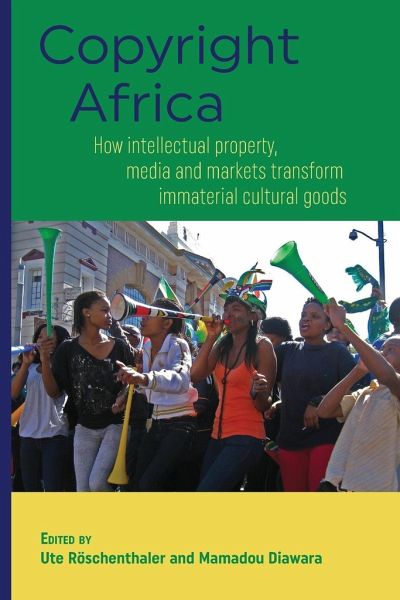
Copyright Africa
How intellectual property, media and markets transform immaterial cultural goods
Herausgeber: Röschenthaler, Ute; Diawara, Mamadou
Versandkostenfrei!
Versandfertig in 1-2 Wochen
45,99 €
inkl. MwSt.

PAYBACK Punkte
23 °P sammeln!
Africa is known for its multi-faceted immaterial culture, manifested in highly original music, oral texts, artistic performances and sporting events. These cultural expressions are increasingly regulated by intellectual property rights, as orally transmitted stories are written down, traditional songs broadcast and ownership claimed, and sporting activities once part of village life become national media events. This volume brings together an interdisciplinary team of legal experts, anthropologists and literary scholars to explore, from an African point of view, what happens to intangible cult...
Africa is known for its multi-faceted immaterial culture, manifested in highly original music, oral texts, artistic performances and sporting events. These cultural expressions are increasingly regulated by intellectual property rights, as orally transmitted stories are written down, traditional songs broadcast and ownership claimed, and sporting activities once part of village life become national media events. This volume brings together an interdisciplinary team of legal experts, anthropologists and literary scholars to explore, from an African point of view, what happens to intangible cultural goods when they are confronted with large-scale commodification and distribution through media technologies, and globalized and divergent judicial systems, institutions and cultural norms. These transformations are observed in contexts that range from Senegalese wrestling contests to beauty pageants in Mali, from Kenyan hip-hop to the Nigerian novel, from the vuvuzela horn to Cameroonian masks. Contributors address the role of the state and the legacy of the European origination of IP laws, as well as the forms of ownership, technologies of mediation and degrees of commercialization that existed pre-colonially in different African societies. Resisting a single narrative of the imposition of a Western legal regime displacing older African modes, a more complex picture is revealed of the intricate interconnections between pirates, artists, communities, governments and international organizations. It is only when local actors embrace technologies and regulations in a specific historical situation that these become influential forces for change. The question raised is not whether international IP norms conform to African practices, nor whether media impose Western styles, but rather what local actors do with these regulations and how both local and Western practices and technologies impact on each other and co-exist.






![Conference on the Copyright Question [microform] Cover Conference on the Copyright Question [microform]](https://bilder.buecher.de/produkte/65/65569/65569925n.jpg)







